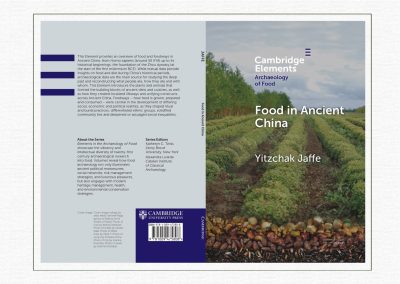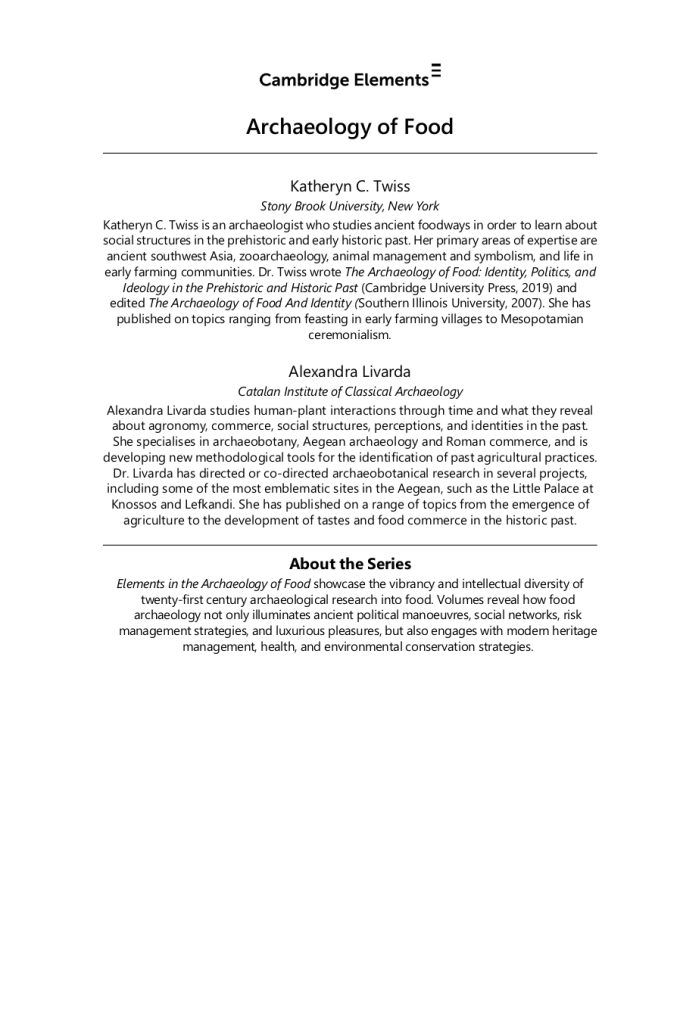
Alexandra Livarda (Ramón y Cajal researcher in the GIAP group at ICAC-CERCA) is one of the editors of the new book collection Elements in the Archaeology of Food, published by the prestigious Cambridge University Press.
The first volume of the collection is titled Food in Ancient China and provides an overview of food and foodways in Ancient China, from the earliest humans (~500k BP) up to its historical beginnings: the foundation of the Zhou dynasty (at the start of the 1st millennium BCE).
Free access for a limited time!
Cambridge University Press is offering free download of the book until December 18th!
According to the same publisher, Food in Ancient China, edited by Katheryn C. Twiss (Stony Brook University, NY) and Alexandra Livarda (ICAC-CERCA), “provides an overview of food and foodways in Ancient China, from the earliest humans (~500k BP) up to its historical beginnings: the foundation of the Zhou dynasty (at the start of the 1st millennium BCE). While textual data provides insights on food and diet during China’s historical periods, archaeological data is the main source for studying the deep past and reconstructing what people ate, how they ate and with whom they ate it.”
This Element introduces the plants and animals that formed the building blocks of ancient diets and cuisines, as well as how they created localized lifeways and unifying constructs across ancient China. Foodways, how food was grown, prepared, and consumed, was central in the development of differing social, economic, and political realities, as it shaped ritual and burial practices, differentiated ethnic groups, solidified community ties, and deepened or assuaged social inequalities.
Jaffe, Y. (2023). Food in Ancient China. Elements in the Archaeology of Food, 1. Cambridge: Cambridge University Press, 2023. ISSN 2754-2971 (online), ISSN 2754-2963 (print). https://doi.org/10.1017/9781009408370
Fifty volumes provide fresh, critical, and authoritative overviews of prominent and emerging topics in food archaeology.
This series on the archaeology of food reveals how archaeological research into food illuminates ancient political maneuvers, social networks, risk management strategies, religious celebrations, luxurious pleasures, and much more. Each volume offers a concise but comprehensive ‘taste’ of its topic suitable for professional archaeologists but also written in a style accessible to students, scholars in fields other than archaeology, and other professionals interested in food in the past. Elements in the Archaeology of Food showcases the vibrancy and intellectual diversity of 21st-century archaeological research into food.
Readers will discover the relevance of food archaeology to broader conversations about cultural heritage, environmental conservation, and public health as they explore topics ranging from dietary medicine to globalization to the symbolism of hunted meat; areas from Australia to Sub-Saharan Africa to China; and foods from mollusks to spices to deer. (Cambridge University Press)

Alexandra Livarda is a Ramón y Cajal researcher in the GIAP research group at the ICAC-CERCA). Grant RYC-2017-22105 funded by MCIN/AEI /10.13039/501100011033 and by El FSE invierte en tu futuro.






